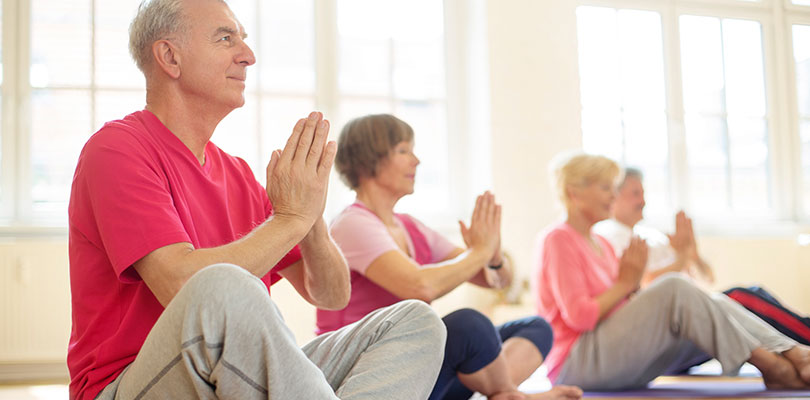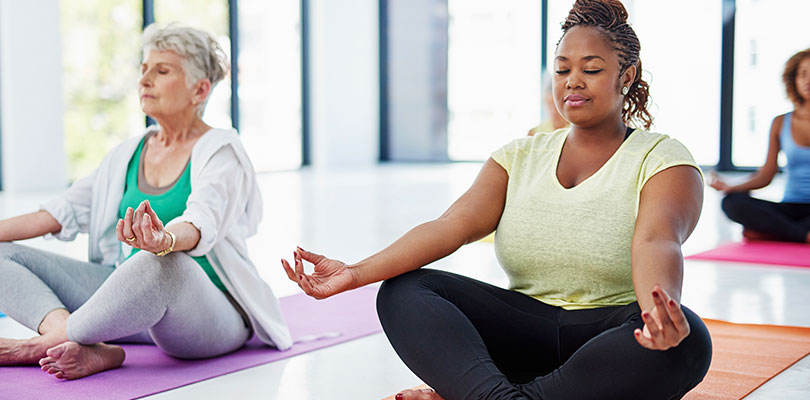
Photo Credit: da-kuk / iStockPhoto.com
Reasons to Take Up Yoga
Yoga, yoga, yoga — by now it probably seems like yoga is everywhere and being done by everyone to improve their physical and spiritual health.
There are classes for kids, classes for older adults, and there are plenty of options for practicing the skills at home.
Yoga is anything but a fad, though, and it is much more than standing like a tree or humming while you sit cross-legged. For thousands of years, people have been experiencing and documenting the real, profound benefits of yoga.
The 6 Branches of Yoga
While most yoga classes and studios focus on Hatha Yoga, there are also many different types of yoga too. In some classes, you may experience one to all of the six branches of yoga. Below is a description of each branch of yoga:
- Hatha Yoga is known as the yoga of physical processes. It incorporates breathing techniques, physical poses and meditation.
- Bhakti Yoga is the path of devotion and heart. Yogis who practice this branch of yoga express and develop tolerance, acceptance and love for all living things.
- Jnana Yoga is considered the yoga of the mind, because it deals with wisdom and knowledge. Jnana yoga's path teaches the "knowledge of true self," in other words it teaches one to obtain intuitive knowledge from their soul.
- Karma Yoga teaches that your present experience is directly affected by your past actions. It's the path of self-transcending achievement and the path of service. Performing a selfless service is the gist of Karma Yoga.
- Raja Yoga teaches natural meditation. Raja consists of a very precise system that attempts to gain control of the physical body, energy, senses and mind.
- Tantra Yoga is perhaps the most misinterpreted path of all the yoga branches. Its rituals teach students to expand their awareness in everything they do, not only sexuality.
Why Yoga Is More Than Just an Exercise
Yoga is more than an exercise for your body; it is an exercise for your mind as well. If you are invested in improving your mental health, physical health, or your overall wellbeing, yoga is for you.
If you need a little more incentive to finally compel you to the practice or to keep you engaged, here are eight yoga benefits with a special focus on the mental health.
Yoga is:
1. A Physical Health Builder
It would be foolish to not delve into the positive effects that yoga can have on your physical health.
The practice is known to build strength while it contributes to your added flexibility, but did you know it can also decrease pain from arthritis, headaches, carpal tunnel syndrome, chronic pain and depression? It also has been shown to reduce blood pressure and improve your sleeping habits. Essentially, it's a chronic pain management tool.
This means yoga can be helpful for so many people in so many situations, especially people who are unable to do more strenuous forms of exercise due to physical limitations.

Photo Credit: Squaredpixels / iStockPhoto.com
2. An Anxiety Buster
Stress, anxiety, worry, and nervousness are a large part of everyday life for many people. Often, people spend too much time pursuing stress-relief techniques that are ineffective, like watching TV, or ones that actually create more damage, like drinking alcohol.
Yoga is about finding a centered sense of peace that opposes anxiety through the use of deep breathing techniques and by practicing guided imagery. It aids in reducing the physical symptoms of anxiety, like muscle tension, as well.
These are some of the same skills mental health practitioners would teach you during a session to manage your anxiety. Whether your anxiety is typical or a major concern, yoga can be part of effective treatment.

Photo Credit: alvarez / iStockPhoto.com
3. A Depression Downgrade
Depression does not only refer to mood; it encapsulates and affects many aspects of your wellbeing, like sleep, energy, levels of interest, and appetite.
Studies have shown time and again that yoga can aid in improving all aspects of depression. Interestingly, yoga produces helpful results in the long-term, but if you are still unsure, consider that it can benefit people after just one class.
People who take yoga routinely report having higher degrees of self-worth and wellbeing, which can lower the chances of future depression.

Photo Credit: Oleh_Slobodeniuk / iStockPhoto.com
4. A Mindful Exploration
Much of yoga focuses on training the participant to be more mindful. Mindfulness is the practice of being tuned in and in touch with all of your senses to observe the messages they are sending to you.
Mindfulness can bring you a new understanding and window into your thoughts, feelings, and behaviors that you have previously avoided. By gaining a better awareness of yourself, you can better understand your motivations and reactions to certain situations.
At times, mindfulness can be intimidating or even uncomfortable, but with practice, you will find this skill very rewarding.
Intermittent fasting can help you lose weight, improve physical and mental well-being, and offer various other health benefits.

Photo Credit: Robert Ingelhart / iStockPhoto.com
5. An Escape Route
When you are stuck in the monotonous routine of your everyday life, you need an escape. You need somewhere to go and something to do other than looking at the same four walls around you. Yoga can be your answer.
As you escape to the world of yoga, the stress and worry of what was previously on your mind fade away. Working hand-in-hand with mindfulness, this escape allows you to return to your life later with a fresh perspective and new motivation.
Some people tend to avoid and escape too much, but engaging in yoga is a great way to moderate the level of escape you employ.

Photo Credit: PeopleImages / iStockPhoto.com
6. An Attention Advocate
So yoga can help with depression and anxiety, but what about yoga for ADHD and other problems related to attention?
Yes, yoga can assist here as well. Someone who finds themselves easily bored with low levels of concentration and impulsive actions may not be drawn to yoga, but exposing yourself to decreased stimulation can help rebuild these skills that ADHD seems to rob from you.

Photo Credit: Poike / iStockPhoto.com
7. A Trauma Minimizer
A trauma is a very significant event or situation from the past that elicits a strong, unwanted emotional response in someone. Posttraumatic stress disorder (PTSD) is a mental health condition that is marked by intense fear, avoidance, and intrusive thoughts (like flashbacks) of the event.
Research is showing that yoga is effective in the treatment of PTSD and other issues related to trauma. The treatment is so effective that it is offered to soldiers returning from active duty employment.
Like other benefits of yoga, the mechanism that improves trauma symptoms is mostly unclear, but it is thought to be related to yoga’s ability to calm arousal of the nervous system. Special care should be taken in the use of yoga with trauma to avoid accidentally triggering trauma reminders through specific positions and thoughts.

Photo Credit: shironosov / iStockPhoto.com
8. A Social Supporter
The previous benefits were all directly related to yoga. This one is an indirect benefit of going to a yoga class: socialization.
As adults, it becomes harder to expand your social support network with new people. Going to a yoga class helps you fight against this trend.
Being in a new environment with new people gives you the opportunity to make new friends, learn new ideas, and expand your current perspectives. A brief conversation after class can lead to a new relationship that will serve you well for years to come. All because you went to a yoga class.
There are few things as annoying as a persistent cough. Although we all know what a cough is, we don’t know what is going on in our bodies when we cough.






